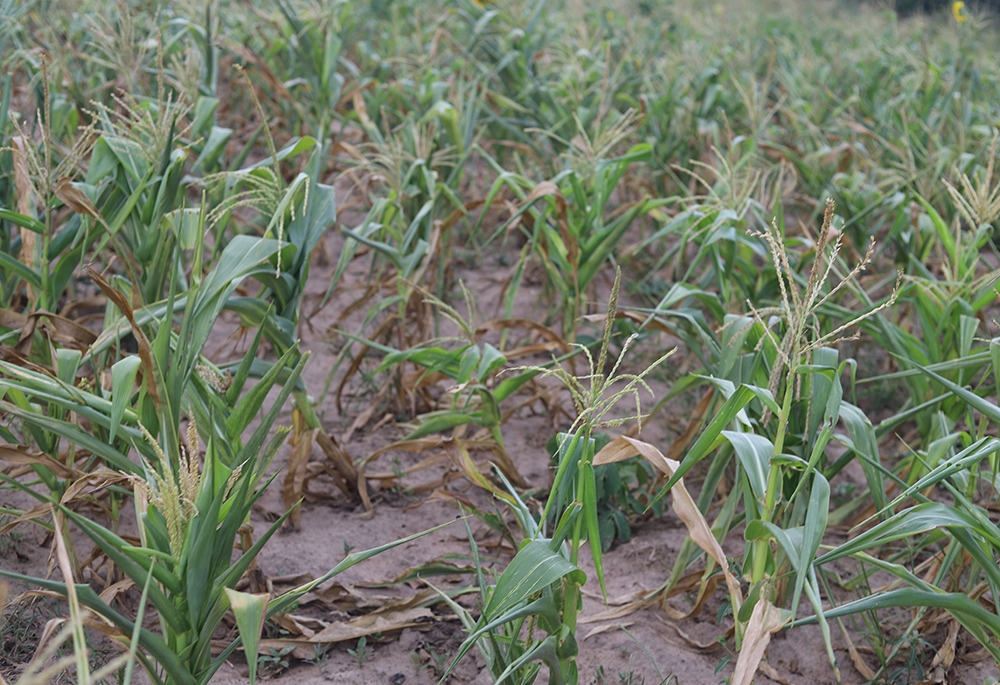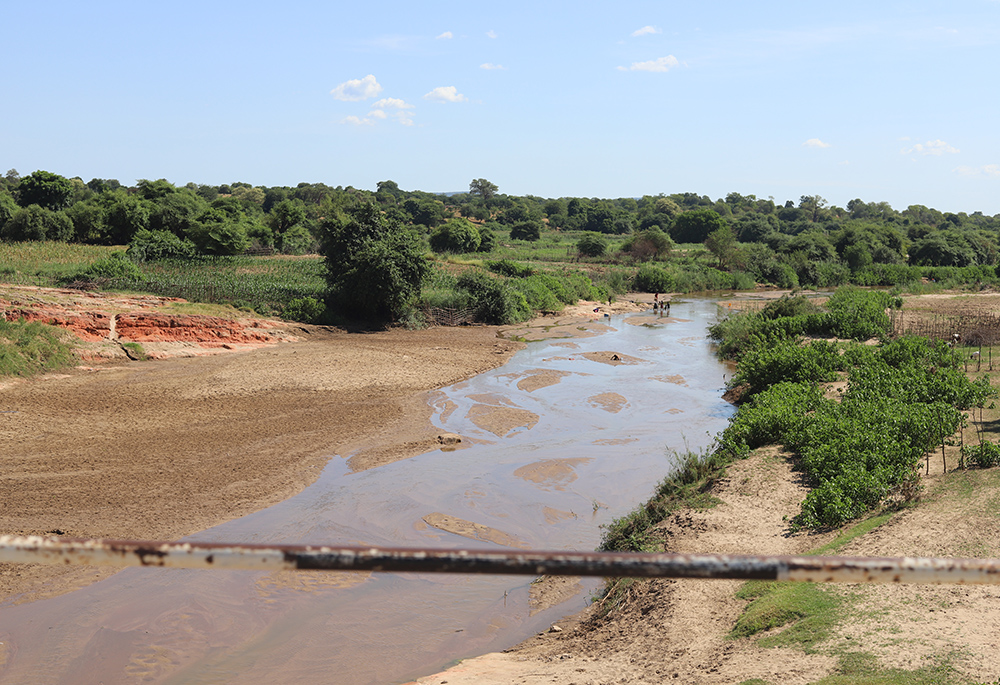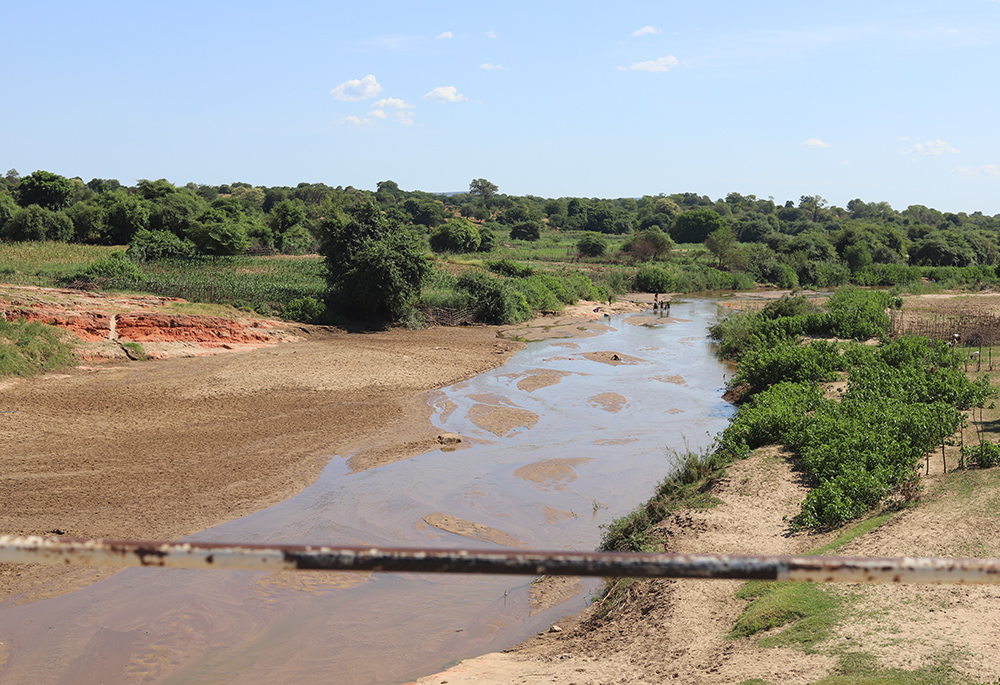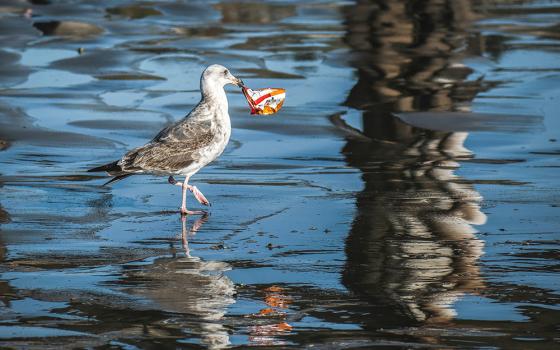
Climate activists, including religious leaders, demonstrate at the COP27 U.N. climate summit on Nov. 11, 2022, in Sharm el-Sheikh, Egypt, calling for increased funding for climate action. (NCR photo/Doreen Ajiambo)
Belvin Mukwanya, a farmer from this drought-stricken town in southern Zambia, is facing an urgent crisis. Extreme weather patterns have ravaged his crops and decimated his livestock, leaving his family teetering on the edge of starvation.
"We have no food due to the drought, and we rarely eat unless we receive food donations from generous individuals," lamented the 44-year-old father of six. "We are suffering the consequences of climate change, and there is nothing we can do.
"We leave everything in God's hands."
Mukwanya is one of the millions of residents experiencing severe hunger in Zambia, a southern African country that has felt one of the worst droughts in its history. Nearly half of the country's 20.8 million people have been affected, and 6.6 million require immediate assistance across 84 out of its 116 districts.
Zambia is just one of several African nations grappling with this extreme drought triggered by the El Niño weather pattern, a situation worsened by the ongoing effects of climate change.

A farm in Zambia shows a failed corn crop due to drought conditions affecting southern Africa, leading to widespread hunger, on March 3. (NCR photo/Doreen Ajiambo)
The Zambian government, which declared a national disaster in late February, has estimated it would need $941 million to provide immediate lifesaving assistance and facilitate early recovery from the crippling drought that has severely impacted food production and power generation.
One possible funding source Zambia has waited to access is the Loss and Damage Fund, established in 2022 by nearly 200 countries under the United Nations to assist developing countries recover from destruction and cultural losses linked to climate change.
"It's been a long wait, and we don't know when this fund will be released to help us recover from the drought," Mukwanya said. "Despite hearing about it, we still lack clear information on when the money will arrive. We pray that it is released quickly to save the lives of those suffering from the drought."
As world leaders and key stakeholders convene inside Baku Stadium in Azerbaijan's capital, Baku, for the U.N. climate conference known as COP29, vulnerable countries remain uncertain about the operation of the significant new fund.

A photo captures the drying riverbed of the Lisitu River in Zambia, on March 3. (NCR photo/Doreen Ajiambo)
Global leaders are facing increasing pressure at COP29 (Nov. 11-22), where the main focus is reaching a new overall target for climate financing from wealthier, developed countries to developing nations. One of the subgoals is to finalize how the loss and damage fund will work and how, and when, money will be distributed.
"Zambia, like many other countries vulnerable to climate change, urgently needs the loss and damage funds," said Dickson Matulula, the green initiatives project manager for Catholic Relief Services (or CRS) Zambia.
Status of loss and damage fund
The Fund for Responding to Loss and Damage was established at COP27 in Sharm el-Sheikh, Egypt, and operationalized last year at COP28 in Dubai, United Arab Emirates. It was a major victory for developing countries and small-island nations who for nearly three decades had championed a means for historic polluters to provide financial recourse for countries experiencing economic and non-economic losses and damages from irreversible and unavoidable impacts of climate change.
Catholic organizations have raised special concern about non-economic losses that hold value beyond the marketplace. That includes lives lost to major storms and droughts, burial grounds now underwater and religious sites damaged or destroyed by extreme weather.
So far, $700 million has been pledged to the fund, including from France, Italy, the UAE, Germany and the U.K. Some estimates suggest climate-related damages at $580 billion by 2030.
The World Bank, selected at COP28 in Dubai to host the fund, approved its role as trustee in June. The loss and damage fund is governed by a 26-member board, including 14 representatives from developing countries (two of whom are from the least developed countries and two are from small island developing states). The Philippines serves as the board's host country. Ibrahima Cheikh Diong is its first executive director.
Essential tasks of defining the scope, scale and fundamental operational policies of the fund are still unresolved. This includes creating simplified and diverse access methods to ensure that it effectively supports the most vulnerable communities in developing countries quickly and without bureaucratic delays.
Climate activists who spoke with EarthBeat indicated these issues are unlikely to be addressed until after COP29, but emphasized reaching consensus on these matters is crucial for funding to begin flowing by mid-2025.
"It is my sincere hope that the Loss and Damage Fund Board will receive more than pledges and propose a financing plan to cater for both economic and non-economic loss and damage," said David Munene, programs manager at the Catholic Youth Network for Environmental Sustainability in Africa, or CYNESA.
"There has to be demonstrable mechanisms for access, adequacy and fairness so that the fund benefits those that need it the most. Any pledges made in Dubai and thereafter must be honored as a matter of urgent priority," he told EarthBeat. "It cannot be documents with words and beautiful speeches alone."

A view of a farm in Zambia reveals a failed corn crop, showcasing the severe impact of the drought in southern Africa, which has resulted in hunger. (NCR photo/Doreen Ajiambo)
Long wait
News of progress on the loss and damage fund has been warmly welcomed in Malawi, says climate activist Sr. Patricia Chimimba, especially among people displaced by Cyclone Freddy and currently living in extreme poverty on the streets or in refugee camps where they lack food and other basic necessities.
In March 2023, Cyclone Freddy struck the southeastern African nation of nearly 21.8 million residents. The longest tropical cyclone on record, Freddy caused mudslides and floods that tore through towns and villages. The cyclone resulted in more than 1,000 fatalities across southern Africa, and left over 660,000 people in Malawi homeless. The destruction included houses, crops, roads, bridges, health facilities, water sources and schools.
In May 2023, President Lazarus Chakwera highlighted the urgent need for approximately $700 million for Malawi's recovery from Freddy. The country has struggled to raise these funds, leaving survivors desperate for humanitarian aid.
"People in this country have been waiting for a year to receive funding to rebuild their lives," said Chimimba, a member of the Carmelite Missionary Sisters. "The hunger situation in Malawi, worsened by Cyclone Freddy, has deteriorated this year. Many people are going to bed with empty stomachs. In rural areas, it is heartbreaking to see individuals cooking raw mangoes due to a lack of food. In suburban areas, many youths are resorting to deviant behavior to meet their basic needs."
Advertisement
Cyclone Freddy is just one example of the ways climate change is exacerbating weather patterns and storms in recent years, Munene and other climate activists said.
Warmer waters in the Atlantic basin have fed into the rapid intensification this year of storms — where wind speed increases 35 mph in a 24-hour period — including in the cases of Hurricanes Beryl, Helene and Milton. Rising seas in the Pacific pose dire threats to coastal and island communities, as well as in Bangladesh, where faster-than-average sea rise threatens to turbocharge cyclones, displace millions of people and submerge 18% of coastal lands underwater by century's end.
"I expect that this COP29 will be the place where policymakers will begin to digress from the politics of climate change and have a genuine encounter with the human face of the sufferings caused by the impacts of climate change," Munene said.

A view of a farm in Zambia reveals a failed corn crop, showcasing the severe impact of the drought in southern Africa, which has resulted in hunger. (NCR photo/Doreen Ajiambo)
Religious leaders, representatives from nongovernmental organizations and other stakeholders emphasize that securing timely funding for loss and damage is crucial for vulnerable communities, particularly in Africa. They are urging immediate action during COP29 to tackle the pressing challenges faced by those affected by climate change.
"African people have contributed the least to climate change, yet from Somalia to Senegal, Chad to Madagascar, we are suffering a terrible toll of this global emergency which has driven millions of people from their homes," said Samira Daoud, Amnesty International regional director for West and Central Africa. "It's time for the countries who caused all this devastation to pay up so African people can adapt to the climate change catastrophe."
"Azerbaijan must deliver the undelivered," Munene said. He added that civil society organizations, the private sector and others must commit to support the loss and damage fund "with fact-checked checks and balances, research and accountability," including for the World Bank.
Meanwhile, survivors like Mukwanya simply cannot afford to wait any longer.
"We urgently need help right now to save lives," he said. "Delaying funds for years makes no sense, especially when people are already suffering and dying from the impacts of climate change."






